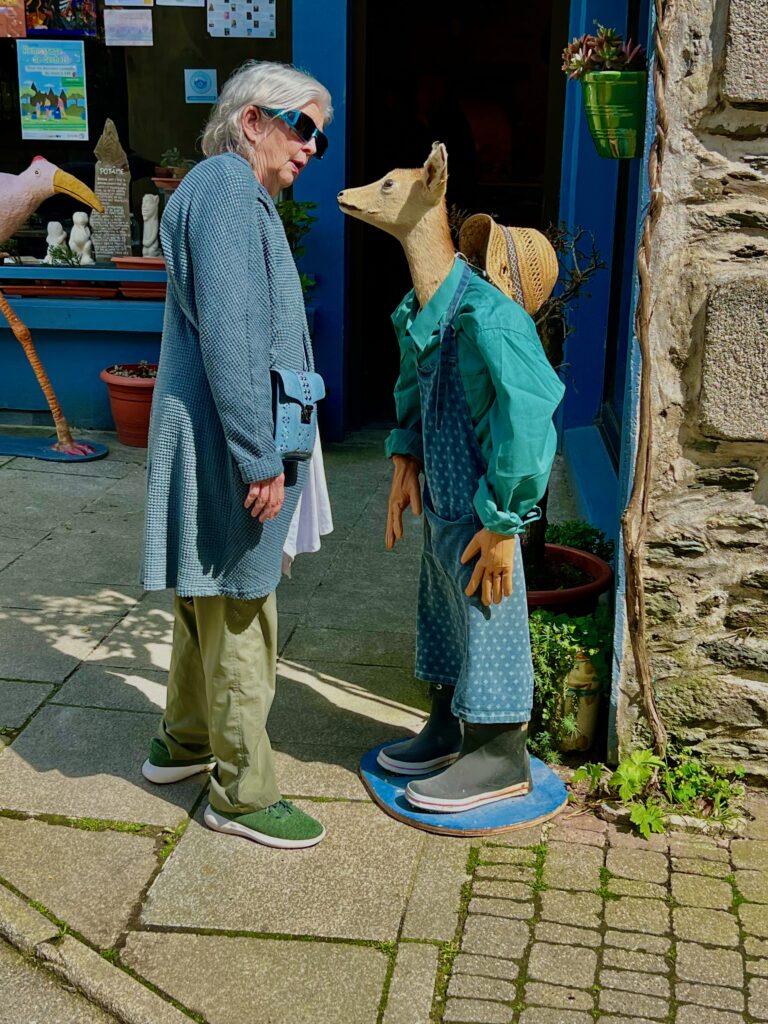
Narratives
-
Narratives
-
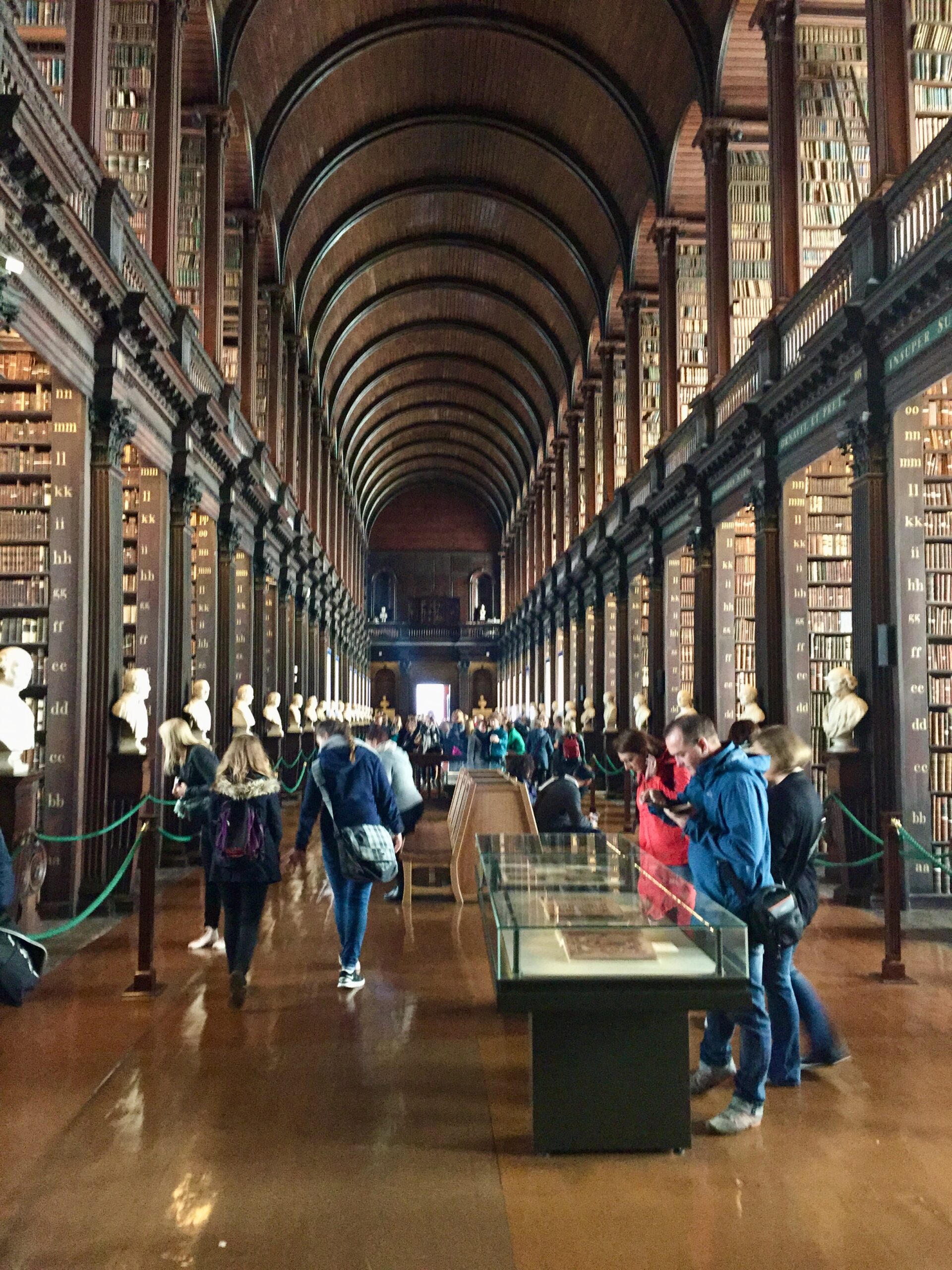
Let the Stories Begin
My grandma loved to tell stories. One of her favorite was set back in December, 1949. Her daughter, my mom, was in the hospital having given birth to my brand new baby sister. She remained there with newborn Susan for ten days, as was the custom. Friends of my parents drove me from Kansas City to St. Joseph to stay with my grandparents for the duration. At age 2-1/2, I had been an early talker. Since my parents departed for the hospital, I had not said a word.
Once deposited in St. Joseph, I remained silent for a few days, then toddled over to Grandma and said, in clarion tones, “I want my mother.”
Grandma answered, “I am your mother now.”
I countered, “Well, I want Ruth.”
That is how I felt then, and feel now. I suspect I am not alone. My grandma was as good as they get, but she did not have the unique qualities of Ruth Lucile Williamson Dowling. No one else did and there never would be.
In Asia, when an elder dies, it is equivalent to a library burning down. Today, we gather to acknowledge a great and gracious library that has been lost. However, we who survive Ruth have as our prized possessions: stories passed down through the oral tradition. I know a few, and I believe you sitting here know more. I hope you will share them.
It is said that what is remembered lives, so let us keep a different kind of fire burning—the flame of love for the distinctive, beautiful generous soul we all knew as Ruth.
Ruth was a preacher’s kid—the third daughter of Methodist minister Aaron Williamson and his wife Dencie. Their first daughter, Grace Elizabeth, was born at a hospital in Boston near the seminary where Aaron was studying for his doctorate in philosophy. Six weeks later, Grace Elizabeth died of bacteria transmitted by unsterile forceps. Grandma never forgot, and it was said she intended to never give birth again in another hospital. Grandma’s second daughter, Roberta, was born two and a half years before Ruth. It is said that Ruth was born in 1920 on the kitchen table of the parsonage in Shawnee, Oklahoma. It was a long and arduous birth, as Ruth had very broad shoulders that her midwife had to keep turning and turning.
Ruth never became an athlete, but her broad shoulders foretold her compassion and legendary willingness to listen to many people’s troubles and understand their points of view—perhaps her most remarkable attribute. Evidently, this was also a special characteristic of her younger sister, Mary Lee. She offered those broad shoulders to me to cry once remotely (that is, long distance, on the telephone) shortly before Ruth’s passing and her own death. Many of you know the stunning fact that Ruth’s sister, Mary Lee, died only eleven hours after. Their consecutive deaths on March 1st and 2nd still have us reeling.
But back to the past. Another story my grandpa loved to tell was indicative of Ruth’s early interest in and lack of fear surrounding death and its aftermath. I believe this event took place at my grandpa’s church in a town in Kansas. Ruth’s sister, Mary Lee, was most likely in arms at that time.
The church and the parsonage were across the street from a mortuary and mortician, surely a convenience. Three-year-old Ruth’s best friend was the son of the aforesaid mortician. The two toddlers had free reign of the parlor where the dead folks were laid out and had an intimate understanding of what death looked like.
One fine day a funeral was taking place, Ruth was playing with the mortician’s son. Grandma was singing in the choir and a prayer was being said. Fortunately, Grandma had not kept her eyes closed for the entire duration because she looked down the center aisle of the church and was quite startled.
Ruth and her friend walked ceremoniously down the aisle covered from head to toe in white flour, which they had ascertained was the appropriate attire to wear to celebrate the beloved dead.
Grandma quickly jumped up, escorted the pair out of the sanctuary to find Mr. Vickry, who read them comics from the Sunday paper for the rest of the morning.
Fast forward from this story to a time when I was in my forties. Ruth found the occasion to ask me not to be afraid of her death. She said it was part of nature and the circle of life, death, and rebirth. I believe these early experiences contain seeds of her enlightened, liberating, and very inspiring work. In addition, Ruth’s sense of life’s beauty and fragility lives with us always—an essential aspect of her distinctive legacy.
Grandma had a nickname for Ruth. She called her “my little peacemaker.” In a noisy household of three little girls, Ruth assumed negotiating and mediating disputes between her sisters and ultimately her brother Bill, who was born seven years after Ruth. Throughout her life, Ruth favored the way of peace and the resolution of conflict using non-violent means. And she wore the mantle of the peacemaker to the end. Her penchant for conflict resolution was not her only talent, as we will see.
Ruth told stories to rival those of her mom. She took the task seriously. The stories had a purpose. She talked early and often of the tough economic times associated with the Great Depression. On Christmas, the family had a tradition of the children drawing straws. The one with the longest straw would receive a gift of monetary value, the others would not. Ruth only ever spoke of the year she drew the longest—never the other years. Her eyes glistened as she described the Chinese pajamas, turquoise and pure silk that were hers alone.
Ruth had an abiding love for beauty in nature, particularly the glittering, energetic hummingbirds, but she adored the innate elegance of textiles. Each year she would make dresses for me and my sister and later for my three daughters.
She was very grateful and put extraordinary stock in the expression. Ruth was renowned for this graciousness throughout her life until the day she died. She would remark, “I cannot thank you enough for all you have done for me.”
Another story Ruth told early and often revolved around higher education. She and her siblings were encouraged to study and were offered a challenge. The one with the highest marks would go away to college—in this case to Ohio Wesleyan University. Ruth made the highest marks. However, a depression was on. It was late in the thirties, and there were no funds for tuition. Ruth went to Oklahoma University where she obtained free tuition since her father was the president of the university. She graduated magna cum laude.
Ruth valued education and became a passionate advocate for women’s access to learning in a university setting. She worked tirelessly for over sixty years with the PEO to provide scholarships and loans to young women from all walks of life. Her chosen career was that of an elementary school teacher. She could make lemonade out of lemons.
She taught for over 20 years beginning when I was seven and my sister five. Ruth shared this passion of the classroom with her sister, Mary Lee. Children were a special joy to them both. They delighted in their careers and treasured their summers and their families.
Back in the depression just a little bit longer. Although Ruth obtained free tuition at the university, she worked after classes at a local bookstore, attaining money for textbooks, clothes, and incidentals. She also developed an abiding interest in reading.
Ruth’s passion for books extended well into her eighties. She would exclaim that she would allow herself an hour a day to read once she was done with what she was supposed to do. I was a notorious bookworm as a child, and she rarely interrupted me although I was supposed to be doing chores. I recall climbing into low branches of an apple tree to read, not coming down until I finished the entire book.
Ruth loved poetry as a young woman and had a secret desire to be a poet. In college, she collected and typed an entire loose leaf volume of her favorites. As a teenager, I found it and Ruth allowed me to keep it. I have it still. Many of the folks here know that poetry is my abiding passion. Ruth could kindle such fires and tend them. My favorite thing is to teach creative writing.
Early in the nineteen forties, rumors of war filled the air. On December 7th, 1941, Pearl Harbor was attacked. That night Ruth became engaged to Charlie Dowling. They married on January 30th, 1942. She wore a gown of seven yards of ivory taffeta, made by her sister, Mary Lee, who later wore the same gown. The war was on, and Charlie worked as one the country’s first air traffic controllers briefly, soon thereafter he began his tenure as a cadet in the Army Air Force.
Ruth loved weddings, wedding gifts, and all things romantic as much as she loathed war and all things warlike. She understood this war had a just cause while knowing what war meant. Deeply and vehemently, she grasped the terrible truth that many of the “boys” would die.
For three years. Ruth followed Charlie up and down the west coast, working in peach canneries, living in rooms in towns adjoining the army bases. Charlie was valedictorian of the class, becoming an instructor as well as a pilot flying supply missions. He never saw the action as many of his friends did.
Ruth spoke many times of how she and Charlie would sit with the widows after they had received “the news.” Particularly devastating were the days following the desolation at Anzio Beach in Italy. Many of their buddies fell in that unfortunate invasion.
Ruth never forgot those deaths nor did she forget why those “boys” died. In her eighties, she watched an old World War II movie at our house in Bonny Doon, California with great emotion. It was not a fiction. This happened in wars. Five years ago, when Geoff and I visited the cemetery at Anzio Beach, Ruth gave us her heartfelt blessings.
So the war passed, and I was born in April of 1947. It was a good year for babies. Ruth’s sisters, my aunts, Bert and Mary Lee also gave birth to my cousins Ed and Diane in 1947, who are here today. The rations were lifted.
The story is told that a good friend came to visit our one-room apartment. I was standing up in my crib. I was not yet two years old. The radio had been on.
I announced, “There’s bacon at Katz.” It was a grocery in Kansas City.
That sentence officially delineated the end of that period for Ruth. Growing up, as often as not, I would awake to the smell of brewing coffee (another rationed item) and crackling bacon. Ruth did not forget the past and its lessons. She carried them with her and presented these memories as gifts to us—tokens of her appreciation to the evanescence of life and its pleasures.
The transition from the forties to the fifties was marked with the birth of my sister, Susan, and the move out of the efficiency apartment into Ruth’s first home. That decade was filled with moves from Missouri to Oklahoma to Indiana to Oklahoma and back to Indiana before leaving the midwest for northern Virginia. We were not alone in this trend.
Exploded families were something of a hallmark of the fifties— something new for the United States. However, Ruth stayed close with her family of origin, no matter how geographically distant they became. If one of her sisters had need for support of any kind, Ruth was there. She wrote letters and made phone calls, taking Susan and me on trains and busses for visits. And the distances were immense and became more so with Aunt Bert’s family in New York, Aunt Mary Lee in Minnesota and Texas, and Uncle Bill’s family in Oklahoma City and Texas.
Every summer we would pile into the car and go to Oklahoma City, where my grandparents lived, for a family reunion with aunts, uncles, and cousins—the vacation of choice. Ruth had a strong opinion that time was of the essence and that one day there would be no more time with the grandparents. We didn’t care to argue with her. Nothing was more fun than lying barefoot with our cousins in the dried grass of our grandparents backyard licking the paddle of the homemade vanilla ice cream maker with the cousins.
Ruth treasured the time with the cousins as well. She hoped for more children but somehow they did not materialize. The offspring of her siblings were a source of great entertainment. Ruth never tired of telling any family news she could get hold of.
The vacation lasted a full two weeks. My father (Charlie) found it challenging to slow down that long. It was one of Ruth’s requirements. I remember the year that Ruth and Charlie began seriously to observe the antics of a family of cardinals. Ruth joined the Audubon Society, learned all the names of the birds, keeping careful records of sightings well into her eighties. I have her annotated Birds of America on my bedside table.
Ruth taught more about death the year her father passed away. She woke my sister and me, told us there would be another star in the sky, our grandfather. We walked slowly in a state of shock into the Ford during a late March blizzard while Charlie drove relentlessly through the two days to Oklahoma. As children, we played in the midst of our grandfather’s wake, but did not attend the viewing or the burial. I spent a lot of time studying the stars wondering which one was my grandpa.
After that, every summer we would have our grandmas, now both widows, stay for a few weeks. Sewing projects would be the focus of the visits. Our school clothes were made—always matching ones—and attire for the dolls as well. Ruth became quite the woman of the needle.
Ultimately, she made gorgeous crazy quilts out of old dresses for our daughters. She fashioned needlepoint pillows and tapestries. The colors and textures made her happy as did her increasing skills although she never felt as talented as she was. Her granddaughter, Sabina, has a business called reincarnated clothing. She creates new garments out of old things that no one wants. Ruth ignited fires that have been impossible to extinguish.
Late in the fifties, Ruth moved with our family out of the midwest to Northern Virginia, then to Great Britain. She was remarkably cheerful about all our moves—probably training from her years as a preacher’s kid. While we whined and moaned, she would proclaim that moves “build character.”
Ruth loved our two years in London and took great pleasure in the live theatre. She would give me a British crown, the equivalent of a dollar and pack me off on the underground (subway). I saw “My Fair Lady” at least a half dozen times. Ruth’s passion endured and her granddaughter Amanda Ruth (Mandy), who is here today, studied in London and has just opened as the lead in a forties drama in a local theatre north of San Francisco. Ruth could kindle such blazes and be resplendent in their glory.
Returning to the Washington D.C. area in the early sixties, Ruth enjoyed a home for a long stretch (nearly ten years), She was a driving and gentle force in an open classroom experiment in Fairfax county. She saw us through high school and launched us in to college. She developed deep, abiding friendships.
When I was miserable over not having been accepted into the college of my choice, she consoled me saying “This too shall pass.” Somehow this advice has been something of a mantra as I ride through the roller coaster of fortune. Ruth could convey in a simple phrase how short and precious life is and how crucial to feel our feelings and move on.
At the turn of the decade, Ruth switched continents, spending the first five years in Brussels. The time there shifted her focus from home and career to travel and more travel. Books, needlework projects, birding, and collage kept her warm. She delighted in showing her family and friends around the area— introducing them to the pleasures of brass rubbing and wines. She loved art and art history and took up collage and painting at that time. The love of travels lives on. Her eldest granddaughter, Larissa, cannot be with us today because of a journey to Beijing, China to work on international internet issues.
In the early 1970’s, the deaths of Ruth’s brother and mother were counterbalanced by the joy of her first granddaughter, Rose. Ruth’s heart was bigger than the ocean separating her from those she loved at these momentous transitions. She kept in touch by writing and taught me pivotal lessons in long-distance spiritual intimacy.
Decades turned faster with Charlie’s retirement and my father and Ruth moved to Tucson, Arizona. On eighty acres adjoining Saguaro National Monument, they designed, built, and artistically decorated their sunset house—a passive solar home.
There, Ruth spent arguably the happiest twenty years of her life— having time to slow down and be one with nature, to watch owls, roadrunners, and other species of birds, to get to know the coyote, javelina, bobcats, and rattlesnakes. Always a rock hound, Ruth became familiar with dazzling colored desert stones and created gorgeous entrances and walls. She transformed broken terracotta pots into meandering pathways. She added vines of bougainvillea and pots of savory basil to the landscape and welcomed two more granddaughters and hosted spectacular egg hunts. She opened her home to countless visitors.
The turn into the decade of the nineties was punctuated by travel to Asia. Ruth would remind us she and Charlie needed to go as many places as possible because each one might be their last.
And travel did become more difficult as Charlie began to suffer from a rare autoimmune disorder savaging his lungs and his vital energy for seven years. Ruth was the consummate caregiver. No one could have been more loyal. She never left his side to the end. However, even in her grief, she relished the family reunion that ensued around Charlie’s Arlington National Cemetery burial.
Some years later, Ruth experienced a decline. Her care was arranged and supervised with meticulous care and deep devotion.
As the century and the millennium turned and Ruth passed her eightieth year, she volunteered for a local hospice and read widely in books on death and dying she had not found time to peruse when she was taking care of Charlie.
Ruth did joyfully attend the wedding of her granddaughter, Larissa in 2000—a year before the birth of her first great grandchild, Rose. Sadly, she suffered a heart attack a year later— almost two years after Charlie died.
After the heart attack, Ruth left, with immense sadness for a retirement in Tucson where she enjoyed visits from her daughters, family, and friends as well as the book club, PEO, yoga, Spanish, and exercise classes. She traveled to Hawaii, Europe, and Costa Rica and came with me to see her sister, Mary Lee, for her eightieth birthday. She mourned the loss of her sister, Bert. She gladly received visits from three of her great grandchildren, tossing a balloon with Mack, watching Caven chase lizards, and playing dolls with Rose.
When Mary Lee suffered from breast cancer, Ruth began a late-life habit of calling her every night. This devotion continued close to the end. When she became unable to call her sister, Mary Lee took up the mantle and called Ruth every night to wish her “sweet dreams and nightie night.”
She fell and broke her wrist, something known as a sentinel event. She was in a number of rehab and assisted living situations. A year and a half later she broke her hip. She spent two years in a skilled facility called La Rosa. Although she was rarely jubilant, she was renowned for her graciousness, humility, and gratitude. Her quiet pleasures were the calls from her daughters and Mary Lee. Throughout her life, Ruth had been a wonderful cook. She did not like institutional food, which had to be pureed, yet she was polite. She was never able to walk again after the hip fracture although she tried her best in physical therapy. Incredibly, no one heard her complain.
In her last year, through numerous hospitalizations, Ruth was ever stoic—a life pattern. It became increasingly hard for her to talk or smile.
In a visit early in December last year, I sat with her five or six hours just to keep her company. She said virtually nothing the first four days. Maybe “hello.”
Then, as I was staring out the window, I heard her voice. “You know about the trip, don’t you,” she asked.
I said, “No, I’m not sure what you mean? Are you going somewhere?”
She answered as she had been wont to do when she couldn’t manifest an answer, “Well, I couldn’t say.”
“Is anyone going with you?” I asked.
“I couldn’t say,” she replied. “Is Dad going with you?” I asked.
“He’s not available,” she countered. “But it would be nice if someone could come,” she asked.
“Are you going on a ship?” I asked.
“Oh no,” she replied.
“Are you going to go on an airplane, then?” I asked.
“No!” she answered. “Are you going to go by car then?” I suggested.
“Certainly not!” She was adamant.
That was that—the last conversation of any length I ever had with her.
After the talk, I might get, “I love you, too, honey or “I love you all,” but nothing approaching this depth. This important gift was quintessentially Ruth. She had told me about the impending passage and let me know her plans—reminding me of how precious life is and how fleeting.
A few days before her death, Ruth experiencing a “rally.” Geoff heard and he rushed down the hall to call me to say she was talking. I arrived, Ruth proclaimed, “I’m getting ready to go.” Ruth was the soul of consideration.
Ruth met her end with calm and clear resolve—organized and composed. She led a long and good life. Her end was not easy, but she had a clean conscience and was truly philosophical. She had close family who loved her. What I have shared is only a tiny fraction of the library that burned down when Ruth crossed over.
“I want Ruth,” and I imagine you do, too. We are bereft, but we are not without a legacy. We need to help each other to evoke Ruth’s ineffable presence. The stories are our rightful legacy. What is remembered lives.
-
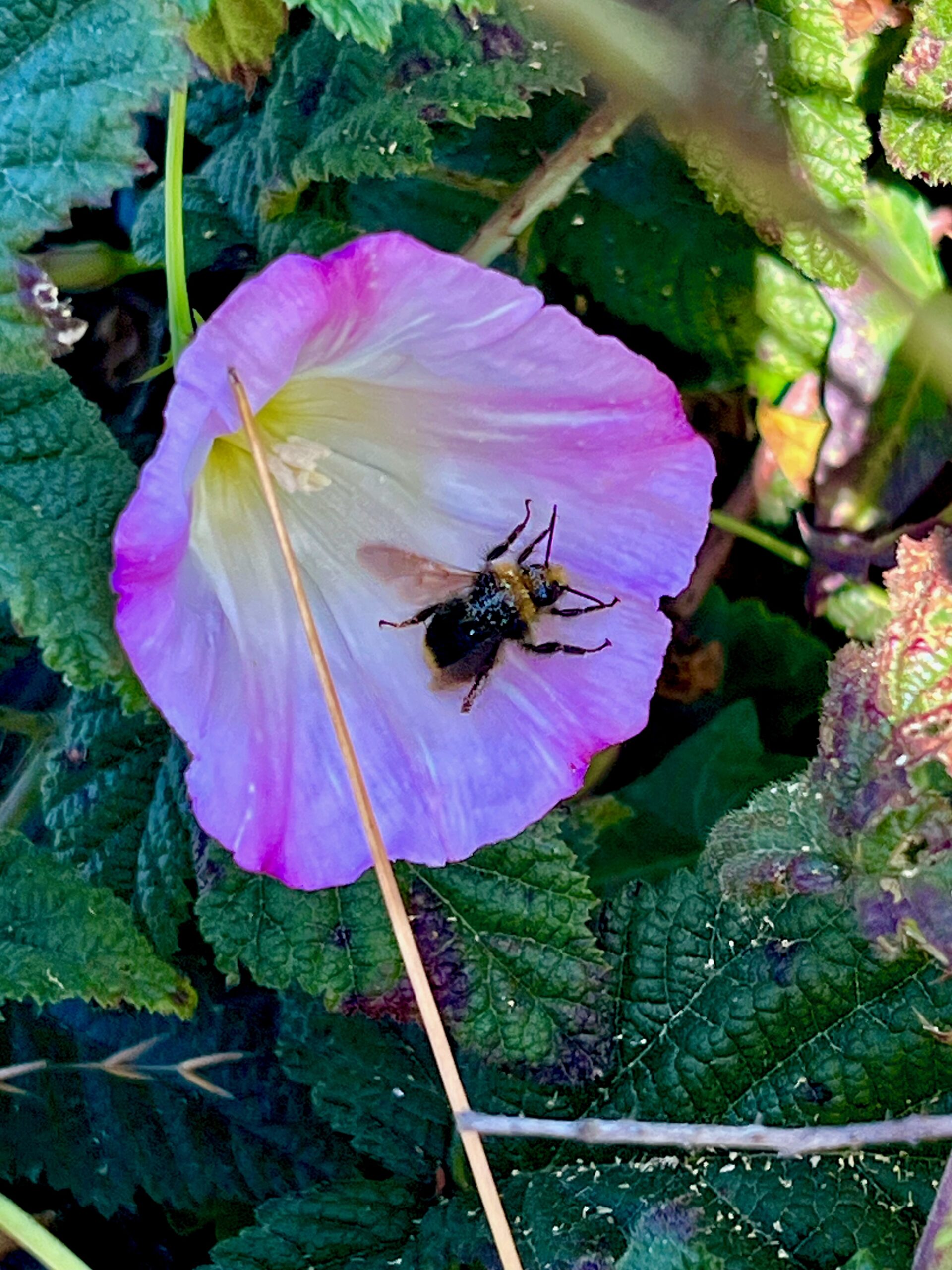
Escape in Music and Books
My occasional escapes were led by Spirit inherent in music. “The Flight of the Bumble Bee,” “Andante Cantable,” “To a Wild Rose,” so many LPs gave me space to soar.
I had another encounter with the sounds and smells of ether when my tonsils were removed. I felt oddly bereft. We moved often and listening to music and reading became my constant companions — particularly in nature.
Being held in the branches of the crab apple tree in Plainfield, Indiana — reading one library book after another.
Every year until my early twenties, the barium enemas and x-rays persisted. Finally, a doctor in New York told me that there was no evidence that I had polyps as a child or that they had been removed surgically. I have never understood this, but I stopped having the dreaded procedures.
I had sensed confinement and the release of spirit at age 9 at Girl Scout Camp in Brown County, Indiana, when we made frog cages out of small milk cartons and mesh. I experienced escape of the frog and the explosion of the self.
I believe these experiences were instrumental in convincing me that my body was a cesspool of shame for which I was to be punished. The medical establishment was utterly complicit in this brain washing.
Yet there was always Spirit teaching that the violated body was part of something grander.
I remember staying up very late searching for the spirit of my grandfather who had died the day before. Staring endlessly at the stars — I had been told the night sky held a new star and it was “he.”
-
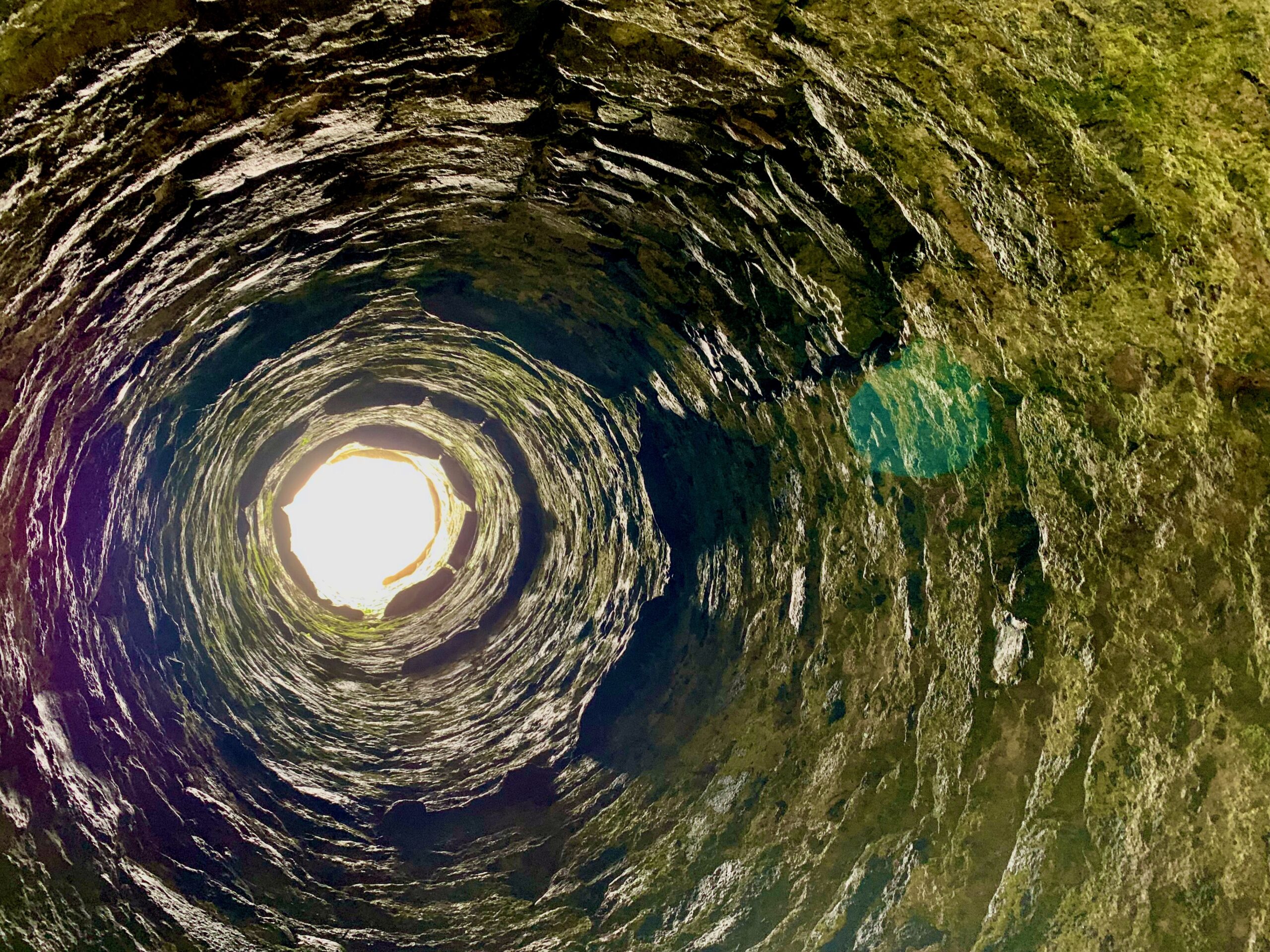
What is at the Threshold of the World?
I am thinking of the world threshold. To thresh means to separate the grain from the plant with a circular movement or by tossing it up and down in a basket.
My friend Ray tells me it meant to take the chaff, the light part of a plant that is not nourishing, and place it on the mud or dirt floor of a house. So threshold marks a portal — it can be a piece of stone or wood that keeps the chaff from being tracked outside.
A threshold is the amount of intensity we must create for something to begin. It is a pivot point. It is dawn. It is where transformation happens.
On Saturday, January 21st, 2017, the threshold was the cold pavement in front of City Hall in downtown Santa Cruz, California. We are gathering for a march organized and choreographed by women. The words going through my head are those of Winston Churchill, “When you are going through hell, keep going.” Those were an inspiration in World War II to the citizens of London.
My legs and my feet are cold and cramped. Standing here, for what seemed like hours, I feel the building impatience of my friends, family, neighbors. The body language says it all — the fidgeting, zigzagging, texting, sighing, pacing seem to go on for an eternity. My eyes are tired of searching for the signs to move vertically in the hands of those in front of us, indicating that we, the crowd, will march as one.
We are at the threshold. It feels incredibly difficult. Our torsos bend forward, we are standing interminably on the threshold, that cement pavement, moving our weight from one foot to another. The human need is shifting us with the urge to do anything other than acknowledge the agony of where we stand. This portal is where we hover, wait, teeter, about to emerge into the vast sea of motion, of the unknown. At this moment, the urge to control, to organize, to dominate is of no use.
For on the other side of the threshold, we will move together. And it comes to me that the place where I can contribute will be here. The place where I can stand is here. My home at the threshold. I worry more about what will happen when I am held back like this, held in place by my own personal issues.
Once the signs sway from side to side as well as up and down, I know I will cross over one dimension of the threshold. I am relaxed and my steps lengthen fluidly— I become a part of something greater than myself.
So the threshold I face daily is this — the terror of ego death, the letting go of any certainty of authority. I sense the disintegration of my lesser self. Yet there is momentum. These times require this. As our ancestors did so long ago, we winnow out that which is no longer needed and retain that which is true and significant. We waste nothing.
This is what is needed to give birth to a movement. To step over the threshold alone, and together, dance and sing, marching despair into resistance.
-
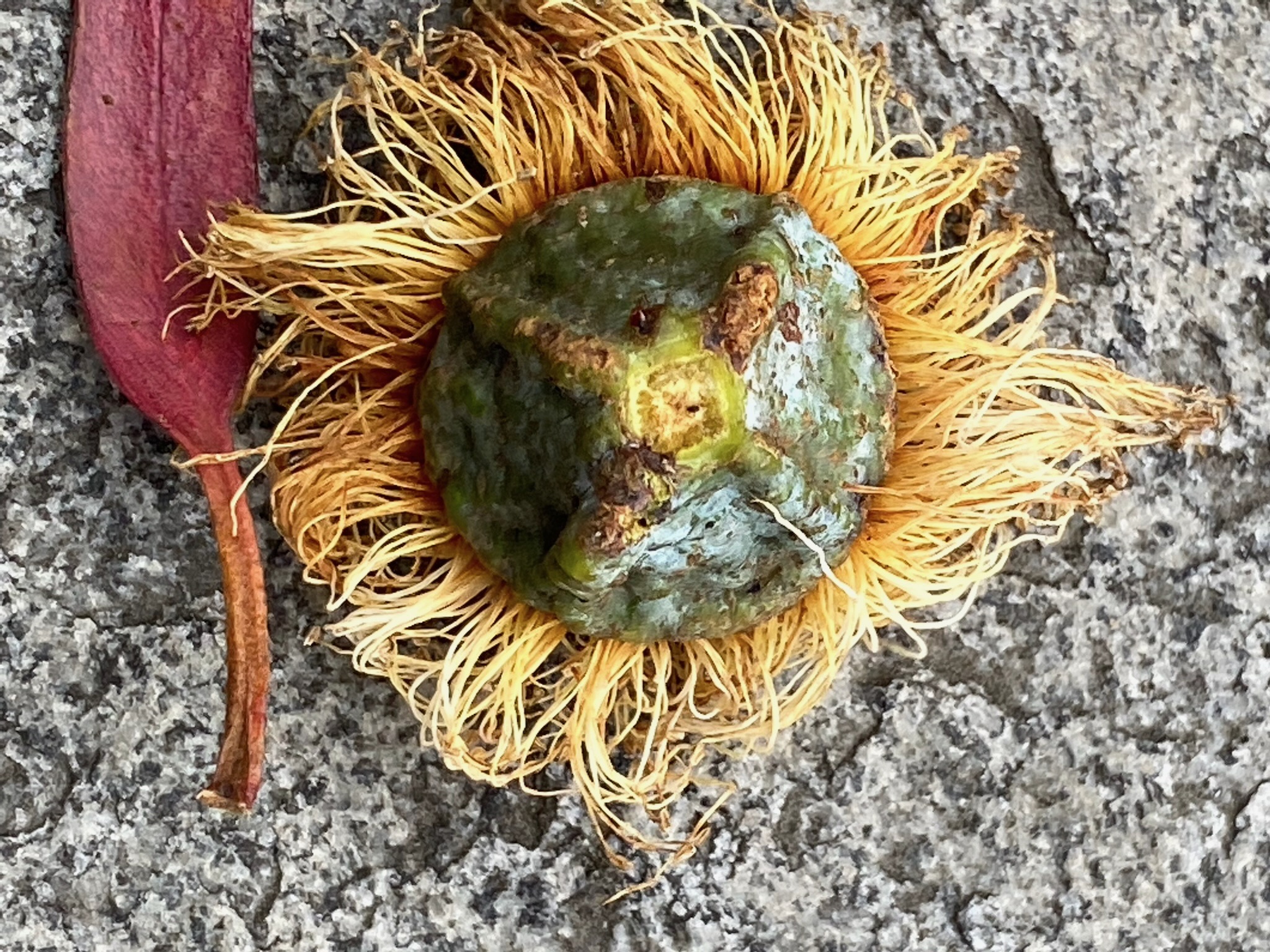
Power of Nature and Vastness of Spirit
Midwest City, Oklahoma 1952
The backyard is fenced by chain links. The screen door off the kitchen is scratchy and leads there. I tiptoe out. I am five and my mother and sister are napping. I know they are tucked in and wandering through the landscape of their dreams. My bare feet navigate the cement on the steps leading to the short brown grass. They are happy to feel the stickiness of the blades as they make patterns on them.
The sight of a hill of red ants awakens my breath. I maneuver around it and cannot resist the urge to fall on me knees to watch the lines of ants inching in and out of the hill. I am in awe. Their bodies are rust colored and shiny in the afternoon light. The spaces in between them in the lines are uniform. The ants are different sizes with different burdens to carry: a piece of rice, a cookie crumb, the corner of a bread crust. I crawl around after them wondering how far they are moving. There are more of these big ants than I can count. I am aware of their pace, their organization. I hear a song in my head as I lie on the parched weedy earth. It carries me somewhere on their trails. The lyrics insist, “I’m gonna live, live, live until I die.” I have entered their realm. The synchronization of their paths, the certainty of their faith. I do not know these words yet, but I feel the journey of the ants in the lyrics.
I am bitten by one of the red ants midway up my left thigh. It moves my attention from the reverie. I brush the ant off and hope it is not injured. I forget the sting. I am very much larger with this sense of the size of things. I crawl away from the ant lines. I am aware of the variety of the weeds and grasses in the backyard, each one making an impression in my knees and shins. I have made an impression too. I know they lie flat in some places, but will rise up like me, like my mother and sister from their nap.
The chain link fence is hot in the sun and separates me from the dusty meadow behind our house and street, but I cannot endure the limitation. I find a sturdy little stick and sit tailor style poking it through a hole in the fence. I move the stick in the rhythm I recall from the song, “I’m gonna live, live, live until I die.” In and out it goes in time. My breath keeps the beat. My eyes soften. The sun beams sparkles on the tall weeds so their brown turns golden. I sense movement on the other side. I keep up the rhythmic moves. And I prepare myself not to jump or wince as a mottled little turtle arrives and snaps the stick right off my fingers. I am not able to retain the stub of the stick. The turtle backs up. So do I.
The wind stirs up in step with the retreat of the turtle backing up from the chain link fence, the purloined stick swept from his mouth into the suddenly swaying grass. Breathing out, I feel the air pressure drop and smell the dust as it rises in a spiral upending the short grass and the red ants. So above, the flat yellow sun hides behind the clouds as grey as steel. The branches of the crape myrtle bend and arch. I stand up and run with the rain. It runs cool and clear down my neck and back, over my bare arms. Not drops but rivulets all over me. And I turn, the rain running all the way down my bare legs to my ankles, my spine tingling with the grace of the liquid sky. Pulling off my shorts and shirt, turning again, leaning into the rain. The yard was too small for anything but running in circles.
I could smell freedom, knowing my mother and sister still slept in the little grey house, their stares, their words, their judgments.
The russet-throated sparrow desperately spreads her wings and rump over her nest of speckled blue eggs. The praying mantis flattens himself on the matted grass. The swallows hover and dive under the eaves. It was as if all of nature were taking in a breath.
And then a rumbling commenced followed by a clap of thunder, the history of all the bolts before it resounding in the sky. The lightning did not hit the little grey house. It was the same source of fire and rain the storm had seen before. All storms were connected The rains enveloped the backyards, the roads, the trees ants, turtles. The sparrows were utterly drenched, stripped of any certainty of survival. Then, without a sign, the storm that lurked in the secret recesses of the wind receded. The clouds loosened. The sun sent her rays down to the newly baptized earth. The creatures who had not drowned looked up in wonder at what had passed and what would return.
I was aware and not aware of the storm and the sun and the lightning and the wind. I had stayed there in the backyard defying my mother’s cries to come inside.
I sensed my balance sturdy as the trunk of the crape myrtle. I particularly loved the dust bunny scurrying across the meadow behind our fence. It reminded me that I am dust and water. Humans are that. To live is to dance in that form—the form of the spiral. And I was dancing on the edge of my grandparents’ DNA.
I was utterly dependent on the temperature outside. The ants organized on the off chance that the rain would not pool excessively. The little turtle was protected from the wind by his shell. And I returned to my little grey house leaving my shorts and tee shirt in a substantial puddle.
We are a web. And each creature depends on the cycles of climate and weather. How strong we are varies. We all want to and are gonna live live live until we die at the bequest of Gaia.
Spirit tells me that the rest of my life I have been trying to get back to the level of sovereignty and freedom I felt that day.
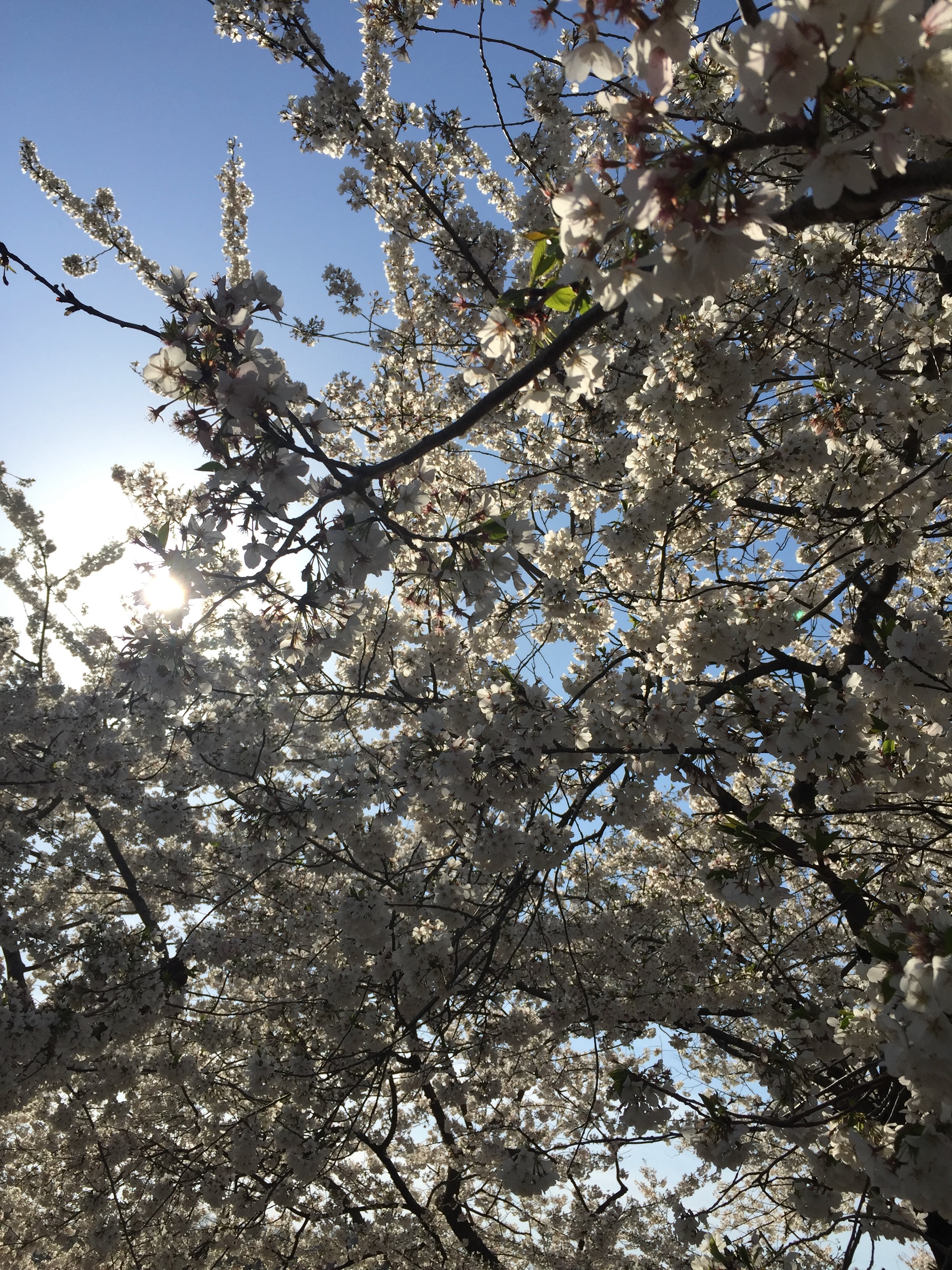
-
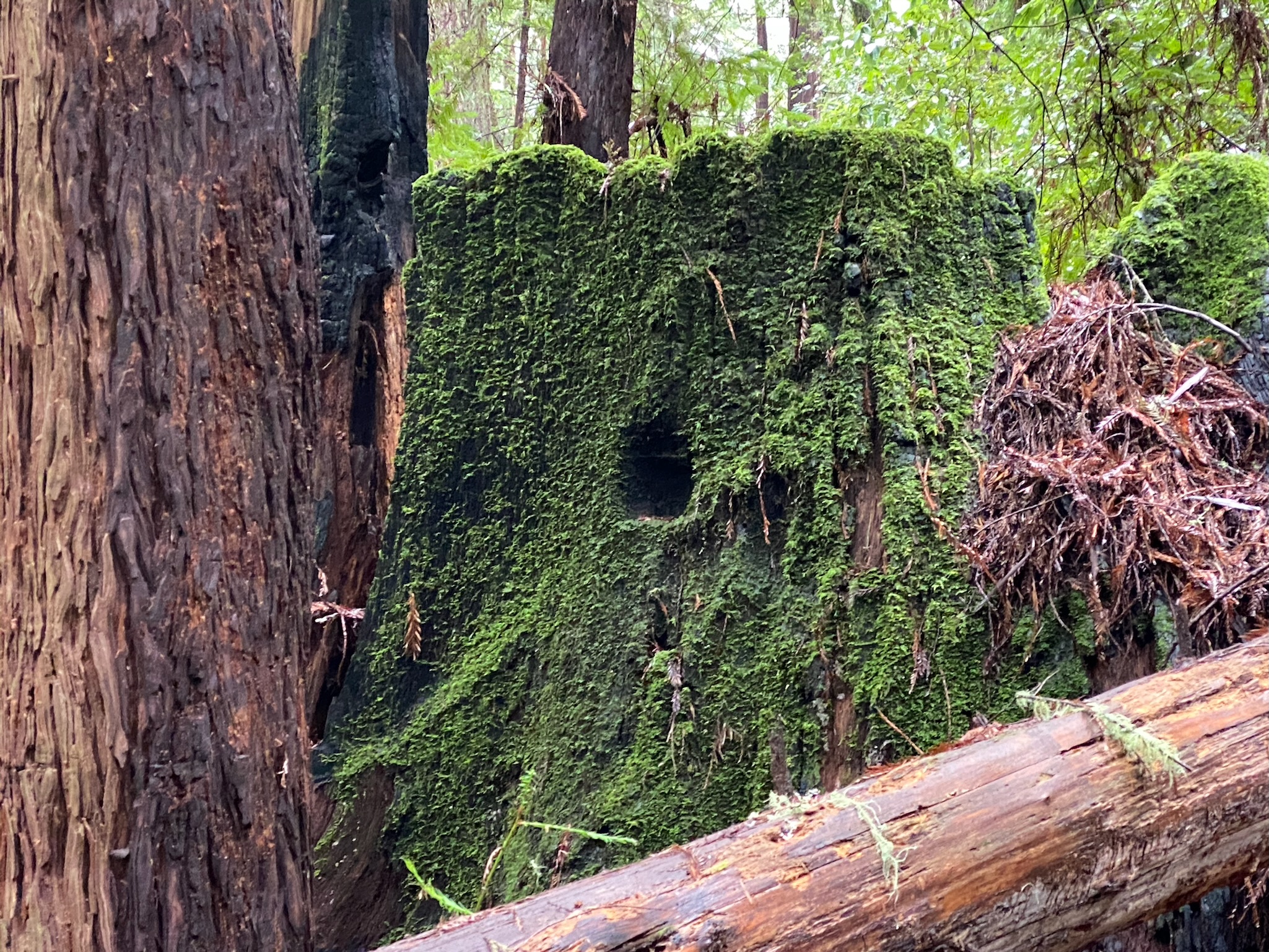
Puma and Coyote Understand My Calling
I walk down to the Grove of the Fallen Giants. It is early evening. The moon is full. I sit down in front of a relatively young redwood tree. My spine is fully supported. I send out roots from my first chakra. Roots run all the way down through the duff, through the Felton Watershed, through the plates, through the underground springs towards the red hot heat of Mother Earth. I begin to breathe deeply and call up the life force into my entire body and soul. I call out to Spirit. I say I need to know what I am being called for.
I rise and traverse the grove taking note of the majestic trees in all the stages of growth and decay. I walk rhythmically, listening for a sound of Spirit. It seems like a long time. I sigh and sit down next to the trunk of one of the fallen giants. I rest my spine and extend my legs out in front of me. I close my eyes and perceive a golden light. I hear paws almost silently trotting through the duff— the faintest rustling.
The sun is down, and the moon has risen. I open my eyes to a pair of glowing gold ones. I hold my breath and do not move. The puma stands directly in front of me glaring into my eyes. I stare back in stark astonishment. Then the puma turns around and settles down by my right side. I place my hand on his back and stroke him gently.
I ask if he knows what I am being called for. He inhales deeply and indicates I am called to become aligned with the best interests of all the sentient beings on and in the land I am responsible for.
I wonder how I do that. He wonders which way we are facing. I respond the North. He nods. He makes it clear animals are losing habitat. They are hungry and thirsty.While I am contemplating the plight of these beings, a gorgeous coyote arrives, stands in front of me, stares, and sits on my left side. I indicate that I would like to know her answer to the same question I have asked the puma. She answers that I am being called not only to listen compassionately to the plight of the animals but to raise my voice in song. I tone.
The trunk begins to vibrate. I sense my instructions from the land: Align, sing, vibrate.
-
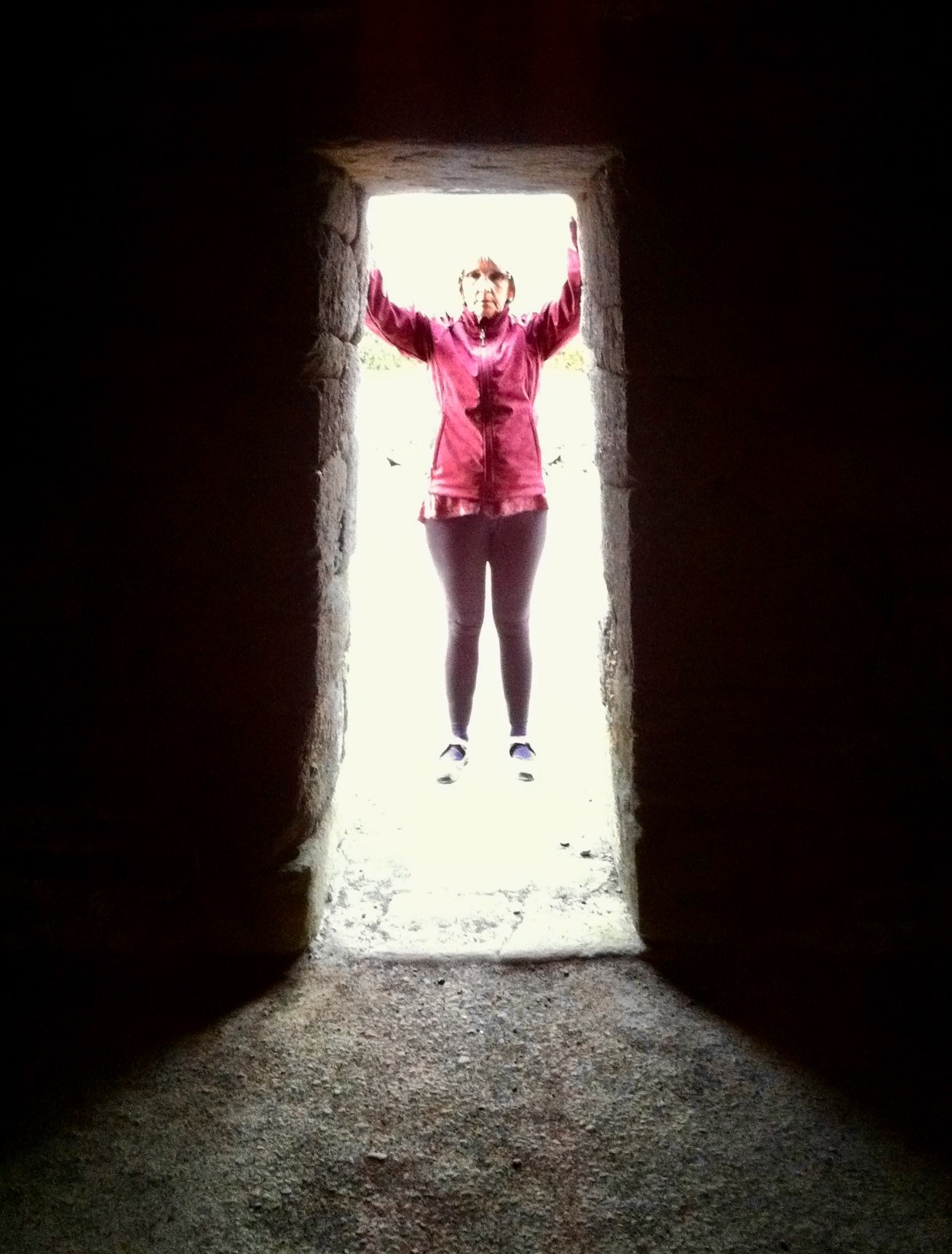
Prayers Matter
I.
Inside an economy apartment in Kansas City, circa 1948,
sitting in a decrepit crib, a girlchild had soul in her eyes—
pixie ears listening to a radio insisting“Katz Drug Store now has bacon!”
The child who could not speak her name, repeating this
news to Bill Smith, her dad’s best friend, Her dad
who called her Titi— inhaled so many Camels.In synchronicity, Titi reveled like a third leg
on a well-honed stool.II.
A child and her doll are one. Her own chocolate doll—
was what she craved.What would parents prefer— the rag, the stuffed, or the
plastic doll. The rough, the soft, the hard. The curl in her
obsidian hair or the emeralds in her eyes.The wonder in Titi’s pink lips blossoming— like Mimosa
framing her window, or the tenderness
in her up-turned nose.Nuzzling her doll, or giving her tea in the spiky ends
of her small ears.III.
Titi loved to watch her dad pacing to and fro, smoking,
moving to the sound of Charlie Parker on the turn table.
Growing up in Kansas City— Cradle of Jazz, where her
dad’s spectrum of kaleidoscopic moods swirled.Oh! You musicians of New Orleans and New York,
do you not know ragtime, bebop, or what’s in the
middle between 18th and Vine?
Why do you imagine only once-famous tunes?Don’t you see how mystery was buried, unseen—
deep in lives of all the souls who knew it.
Souls recalled cutting remarks, stunning insights—
yet Titi knew we were involved in what was known.IV.
When we left the place of the cradle, to move into
the GI Bill house, feeling it fly out of sight— breathless
with wanting— Count Basie— Joe Turner implicated.
Within a year, the little house was vacated alongWith jazz. Although Indianapolis was full of music
in the duplex they rented—Titi learned to cross railroad tracks to kindergarten,
escaping the company of larger rats.Within the vision of Titi, untethered from her former
homes, even the teachers of the midwest would throw
down their gauntlets.The fifties arrived, so Fords were abundant.
V.
Titi’s grandparents taught rhythms old as heartbeats,
sang truth in songs others wouldn’t dare. At times,
Titi’s family felt a sense seized them— confusion of
silhouettes— of strivings made way for others.VI.
Days, nights until wine of spirit started flowing—
Blood Red. Titi’s dad parked the Ford in Tulsa—
he needed to tell his daughter something.
A sign for Greenwood appeared.Her dad mentioned a massacre— happened
year he was born — 1921. Black Wall Street—
most wealthy black community in America,At the time— 10,000 citizens left homeless—
attack by ground— The only assault by plane
until Pearl Harbor. No one talked about it.Oklahoma school curriculum didn’t mention
the massacre until twenty years after Titi’s dad
died— Mass graves are still undeciphered.VII.
Three vultures with lacy wings circled around Titi’s family
one last languid time— soaring in a circle of power, of
grace. Titi’s dad following their moves through blackBinoculars, breathing softly, pacing endlessly with the
Camels. Titi loved the elevated flight of vultures—
entranced by ascension— climbing mountain tops not inHer purview. Her father— a man at one with earth’s
cycles. Titi had so many questions left— unanswered—
twinkle in both eyes, or how he wrinkled them
to wink at those he saw.Elm Trees fell that day covering the land with golden rapture.
VIII.
99 miles from Tulsa to Oklahoma City. Inevitably, Titi’s
dad’s keen senses trembled, silently marking passage
as the Ford intertwined a stark landscape
choking with mirth, with loss.Do spirits who honor generosity, notice how wind releases brilliant leaves? Anytime to pray, feeling Titi’s zeal pulse
through her breath, immersed in wonder.IX.
The odor of Han’s restaurant overwhelmed
the family as they pulled into the parking lot
in Oklahoma City. It was midnight all day long,
feasting— ribs, sweet potato pie for everyone.The sky would fall as soon as it rained. Titi fell
asleep near the grill Han’s had built, for comfort,
to take away the pain.She dreamt of shanty towns and vultures, venerable
creatures. Titi was told their hallowed purpose
of taking what is goodX.
From what no longer lives, consecrating
with epicurean delight. Her dad blessed
the dynamic beat of Lester Young alongWith the sacred sound of intensity.
Titi could fathom her dad’s astute
aspect, knowing she could perceive.XI.
1959— Titi’s dad navigating Volkswagen Bug
to Constitution Hall, hoping to hear the Boston
Symphony, reflecting on each sparkling note.Titi made it until intermission, saw twin white
enamel— water fountains— two signs
indicating white— colored. Her eyes —Gleaming, radiant—paralyzed hypnotized,
Titi pulled her father’s arm to refuge outside.
A sliver of moon slipped behind a shadow
in a maple tree.XII.
She would not go there again. Years later, Titi wrote an
editorial welcoming the first young woman integrating
her school. Among ball point pens, the spirit movingTowards harmony was Titi’s. Her words were seen
by beings with red heads, black and white bodies.
Announcing their noisy hateful conflicts, she whoWould relieve them, stood thoughtful, listening.
Titi blessed the balm of language. She knew
its secrets. Oh! You who worship what matters,
stop to pray and feel.XIII.
Years later, the balm of words abandoned Titi. Her father
had packed both cars out front of the split-level house in
McLean. The sun bore its rays those weeks in October.Its generosity went unnoticed as Titi gazed upon leaf—
after— leaf dance in the breezeway. Titi saw clouds
silently shifting— dad revealed the Cuban Missile Crisis.Titi’s soul ambled in night to the sound of his deep
voice reciting his possible destination — a bunker in
Richmond. The news was startlingly cool— like the
yellow of butter on the edge of a table knife.Titi asked could she come along— her dad silent.
Outside a sliver of the moon slipped behind
a shadow in the sycamore tree.Titi would never know the answer. Close call —
the mighty madness of the bomb, left Titi flipped,
flailing in a realm of uncertainty.XIV.
On the evening of her 21st birthday, Titi was at college,
Dozing, far-gone, dreaming inside starry points of joy,
when moonlight’s mad surge revealed a group of
motley friendsSuggesting merrily she spent a not-so-silent night in a bar.
Among them, within her ever sharpening swords of fright,
Titi pushed through a dirty sliding door, heard brash voicesOf those who mocked the gruesome end of Martin
Luther King. Screaming, running outside, finding
spells of slumber stealing the darkness—Burning the city of our lament.
